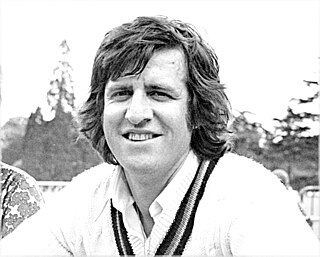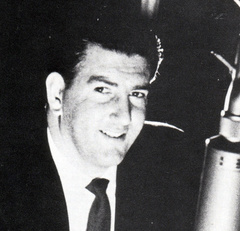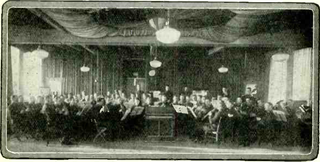Related Research Articles

BBC Radio 4 is a British national radio station owned and operated by the BBC. The station replaced the BBC Home Service on 30 September 1967 and broadcasts a wide variety of spoken-word programmes from the BBC's headquarters at Broadcasting House, London. Since 2019, the station controller has been Mohit Bakaya. He replaced Gwyneth Williams, who had been the station controller since 2010.
The British Broadcasting Company Limited (BBC) was a short-lived British commercial broadcasting company formed on 18 October 1922 by British and American electrical companies doing business in the United Kingdom. Licensed by the British General Post Office, its original office was located on the second floor of Magnet House, the GEC buildings in London and consisted of a room and a small antechamber.

It is generally recognized that the first radio transmission was made from a temporary station set up by Guglielmo Marconi in 1895 on the Isle of Wight. This followed on from pioneering work in the field by a number of people including Alessandro Volta, André-Marie Ampère, Georg Ohm and James Clerk Maxwell.
2LO was the second radio station to regularly broadcast in the United Kingdom. It began broadcasting on 11 May 1922, for one hour a day from the seventh floor of Marconi House in London's Strand, opposite Somerset House.
Alan Dedicoat is an English announcer for programmes on BBC One. He is known as the "Voice of the Balls" on the National Lottery programmes, providing a voiceover for the draws since 1995. He was a BBC Radio 2 newsreader until his retirement from this role in March 2015. Dedicoat is the announcer on BBC One's Strictly Come Dancing and its American version, Dancing with the Stars.

Captain Leonard Frank Plugge was a British radio entrepreneur and Conservative Party politician.

Peter Pendleton Eckersley was a pioneer of British broadcasting, the first Chief Engineer of the British Broadcasting Company Limited from 1922 to 1927 and Chief Engineer of the British Broadcasting Corporation until 1929.

Francis Roy Plomley, was an English radio broadcaster, producer, playwright and novelist. He is best remembered for devising the BBC Radio series Desert Island Discs, which he hosted from its inception in 1942 until his death.
Peter Ian Donaldson was an English newsreader on BBC Radio 4.

Edward Stewart Mainwaring, known as Ed "Stewpot" Stewart, was an English radio broadcaster and TV presenter. He was principally known for his work as a DJ on BBC Radio 1 and Radio 2, and as a presenter of Top of the Pops and Crackerjack on BBC Television.

A radio personality is a person who has an on-air position in radio broadcasting. A radio personality who hosts a radio show is also known as a radio host, radio presenter or radio jockey. Radio personalities who introduce and play individual selections of recorded music are known as disc jockeys or "DJs" for short. Broadcast radio personalities may include talk radio hosts, AM/FM radio show hosts, and satellite radio program hosts, and non-host contributors to radio programs, such as reporters or correspondents.
The year 1926 saw a number of significant happenings in radio broadcasting history.
Radio Luxembourg was a multilingual commercial broadcaster in Luxembourg. It is known in most non-English languages as RTL.
1922 in radio details the internationally significant events in radio broadcasting for the year 1922.

Cyril Frederick "Bob" Danvers-Walker was a British radio and newsreel announcer best known as the offscreen voice of Pathé News cinema newsreels during the Second World War and for many years afterward.

Barry Alldis was an Australian presenter on British radio, most notably on the English service of Radio Luxembourg. Alldis' contribution to UK radio is commemorated in the Radio Academy's Hall of Fame.

5IT was a British Broadcasting Company radio station which broadcast from Birmingham, England, between 1922 and 1927.
Charles Chalmers Maxwell was a British radio producer who produced shows for the BBC such as Take It From Here and brought together the scriptwriting partnership of Frank Muir and Denis Norden. Later in his career he commissioned the long running series I'm Sorry, I'll Read That Again.
John Hamilton Maxwell Staniforth CBE, known to his family as Max, was a British soldier, railwayman, radio presenter, clergyman and scholar.
This is a list of events from British radio in 1922.
References
- ↑ Stephen Williams, "Pioneering commercial radio the D-I-Y way", European Journal of Marketing, October 1987. "Stephen Williams". Archived from the original on 3 September 2003. Retrieved 29 April 2007. ISSN 0309-0566 (journal title and date wrongly cited on web page).
- ↑ Roy Plomley, Days Seemed Longer: Early Years of a Broadcaster, London, 1980, p.123. ISBN 0-413-39730-0
- ↑ Sean Street, "Radio For Sale: Sponsored Programming in British Radio during the 1930s", in Sound Journal, Bournemouth University, 1999.
- ↑ Williams, op. cit.
- ↑ Sean Street, "Recording Technologies and Strategies for British Radio Transmission Before the 2nd World War", in Sound Journal, Bournemouth University, 2002.
- ↑ "Last hours on 208m", aircheck available at playlist No 40 on The Station of the Stars: Audio Archive.
- ↑ Department of Germanic Studies, University of Sheffield Archived 2007-04-30 at the Wayback Machine